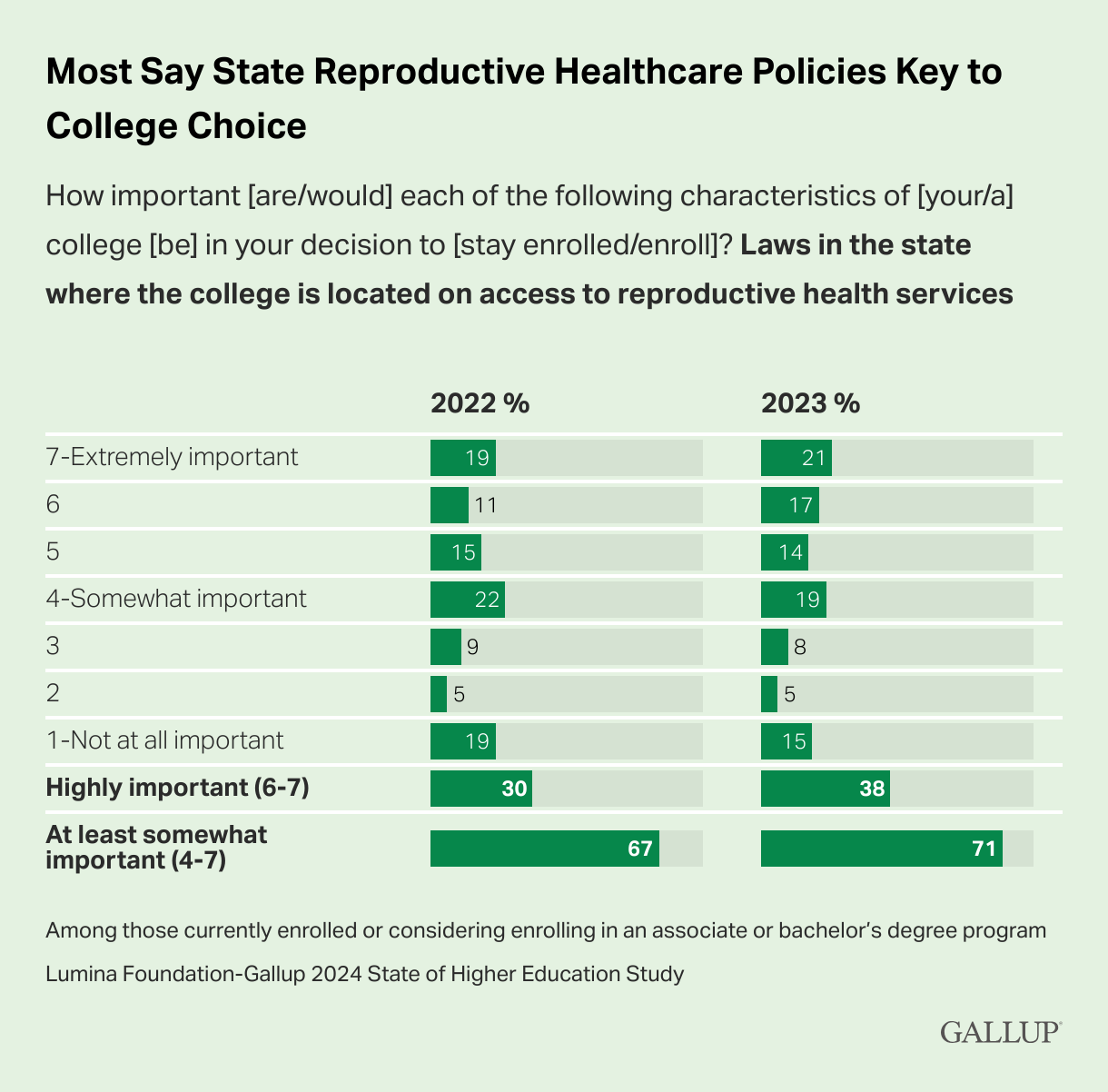Students are prioritizing campus policies on guns and state laws on reproductive healthcare access
New data from Gallup and Lumina Foundation, and a look at Students for Biden's kickoff event 🚀 with Democratic Rep. Maxwell Frost, the first Gen Z member of Congress.
Prospective college students are prioritizing campus policies on guns and state laws on reproductive healthcare access when deciding where to go to college, according to new research conducted by Gallup and Lumina Foundation, which focuses on increasing access to higher education.
The data illuminates stark realities about how members of the lockdown generation are thinking about college enrollment in a post-Dobbs America - where the landmark Roe v. Wade precedent is no longer the law of the land, and amid high levels of gun violence across the country. In the past few years, there have been school shootings at the University of Virginia, Michigan State University, the University of Nevada Las Vegas, and more.
Gallup’s new data shows that 81% of current and prospective students view campus gun policies as “at least somewhat important” to their decision to stay at or attend the school. Asked if they preferred “tough” or “few” restrictions around guns on campus, 84% of current or prospective students who said gun policies were “at least somewhat important” to their enrollment decision said they favored “tough restrictions on gun ownership that banned or made it hard for people to have guns on campus.” And, according to Gallup, “one in three in-person students worry at least a fair amount about gun violence on their campus.”
When it comes to reproductive healthcare access, Gallup’s new data shows that 71% “of currently enrolled and prospective college students say that states’ reproductive healthcare policies are at least somewhat important in their enrollment decisions.” That number has jumped by four percentage points since late 2022.
Of the students who are prioritizing states’ reproductive healthcare policies, 80% are looking for schools in states with more access to reproductive healthcare, while 20% are in favor of a school in a state with more restrictions around reproductive healthcare.
Students for Biden hosts first event, leaning on surrogate Rep. Maxwell Frost
As a kickoff to its newly announced organizing effort, Students for Biden hosted its first event of the cycle last night, featuring Rep. Maxwell Frost — the first Gen Z member of Congress — and Lexi Underwood, an actress and singer. The live Zoom call was hosted by Eve Levenson, who’s 24 and the director of youth engagement for the Biden-Harris reelection campaign (you may remember Levenson from her previous work at the Democratic National Committee or with the Youth in Gov coalition).
Underwood gave introductory remarks at the start of the call — which Levenson said racked up hundreds of viewers — highlighting priority issues for young people that the Biden administration has made headway on like the economy, healthcare, cost of living, and student debt cancellation. She also emphasized the history-making nature of Vice President Kamala Harris, as the first woman, and first woman of color as vice president, and Justice Ketanji Brown Jackson, as the first Black woman on the Supreme Court.
Next, Levenson interviewed Frost; the pair (who have been friends since their time organizing together at March For Our Lives) engaged in a back and forth about why Frost is supporting the president as a member of the Biden-Harris 2024 national reelection advisory board. Levenson said that Frost will “obviously” be “a really big part of [the campaign’s] work to reach young people.”
Asked what role youth groups can play in the Biden-Harris campaign’s efforts to reach young people, Frost emphasized the importance of merging politics and culture — a mission he continues to prioritize as a member of Congress. He also spoke about the importance of reaching young people beyond the student population.
“Something that we always like to do is to go to concerts and go to shows and places of culture. One of the mottos that my team and I have is we want to bridge the gap between cool and consciousness. And I think we have an opportunity during this election to do that very sort of creative organizing,” Frost told participants on the call.
Recognizing concerns from skeptics, Frost pushed back against the narrative that young people don’t vote, or aren’t going to vote in November.
“Let's be honest, you know, we hear this time and time again. ‘Why don't young people vote?’ And I'm always like, ‘Hold on, chill out for a minute,’ because young people are voting at higher numbers than they ever have in this country's history. Gen Z, we're the most progressive generation, we're also the most politically active generation. Does that mean that we can just throw our hands up in the air and say we're done? No, we have a lot of work to do to build more political power for and with young people, but it’s going to take that creative organizing and reaching people where they’re at,” Frost said. “So I just want to thank all the groups out there, and I'll be out there with you — making sure that we're connecting with people everywhere that we can. Sometimes it's not about inviting people to our table, but it's about us going to there’s. And that's how we're gonna really expand this coalition.”
⬇️ Sharing my latest: Teen Abortion Access Remains Difficult Even in States Where Access is Protected
This week for Teen Vogue, I wrote about a first-of-its-kind report on national abortion access for youth from Planned Parenthood League of Massachusetts’ ASPIRE Center for Sexual & Reproductive Health. The report showed that even in states like Massachusetts, which is considered a safe haven for abortion in a post-Dobbs America, reproductive healthcare access for minors can be hard to come by due to parental involvement laws or the judicial bypass process. You can read it here.








